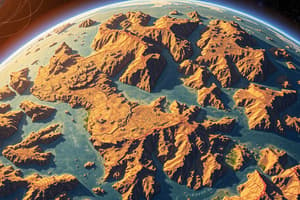Podcast
Questions and Answers
What do the geographical concepts mainly help us to do?
What do the geographical concepts mainly help us to do?
- Understand the world's geography through physical laws
- Make sense of our world and imagine different possibilities (correct)
- Learn to identify geographical features on maps
- Minimize human impact on the environment
Which statement best describes 'place' in geographical terms?
Which statement best describes 'place' in geographical terms?
- It refers to the absolute and relative location of an area. (correct)
- It is a fixed point with no subjective interpretations.
- It solely represents a physical landmark.
- It characterizes urban areas without considering rural environments.
How is the concept of change best understood in geographical studies?
How is the concept of change best understood in geographical studies?
- By focusing on immediate changes occurring in a location
- Using time to comprehend spatial patterns and environments (correct)
- Through visual representation of geographical features
- By measuring physical distances between locations
What is meant by interconnection in geography?
What is meant by interconnection in geography?
In geographical context, what does the concept of space solely focus on?
In geographical context, what does the concept of space solely focus on?
Which of the following best illustrates the concept of sustainability?
Which of the following best illustrates the concept of sustainability?
Which aspect is NOT considered when discussing the concept of 'place'?
Which aspect is NOT considered when discussing the concept of 'place'?
What role does location play in the concept of 'space'?
What role does location play in the concept of 'space'?
What does sustainability primarily focus on?
What does sustainability primarily focus on?
Which of the following is considered a form of environmental change that can occur rapidly?
Which of the following is considered a form of environmental change that can occur rapidly?
Which of the following is NOT a way to improve sustainability at the local scale?
Which of the following is NOT a way to improve sustainability at the local scale?
What is the relationship between emigration and immigration?
What is the relationship between emigration and immigration?
What is meant by 'uneven urbanization'?
What is meant by 'uneven urbanization'?
When considering geographical questions, what does the concept of scale help with?
When considering geographical questions, what does the concept of scale help with?
Which of the following enhances sustainability at the city scale?
Which of the following enhances sustainability at the city scale?
How does the environment influence our lives?
How does the environment influence our lives?
What is a common consequence of rapid urbanization?
What is a common consequence of rapid urbanization?
Which behavior is encouraged to improve sustainability in urban areas?
Which behavior is encouraged to improve sustainability in urban areas?
Flashcards are hidden until you start studying
Study Notes
Geographical Concepts
- Seven major geographical concepts aid in understanding the world: space, place, interconnection, change, environment, sustainability, and scale.
- These concepts allow investigation of the world and foster imagination of alternative possibilities.
Space
- Space refers to the Earth's surface where every location has a distinct geographical positioning.
- Studying location and distribution elucidates how societal organization of space affects global realities.
- Places have absolute (latitude and longitude) and relative (distance and direction from other places) locations.
Place
- The world comprises diverse places that influence daily experiences and perceptions.
- Understanding places involves analyzing their unique qualities and how they are altered or constructed by human interaction.
- Personal perceptions of places, like cities or neighborhoods, can significantly differ among individuals.
Interconnection
- Due to interconnections, people and entities in various locales influence each other.
- Changes in one area can trigger responses or transformations in distant regions, illustrating the concept’s relevance.
Change
- Change examines the temporal aspect of geography, revealing how places and phenomena evolve.
- Changes may occur rapidly (e.g., landslides, volcanic eruptions) or gradually (e.g., urban expansion, landform shifts).
Environment
- The environment encompasses the physical and biological contexts that sustain human and ecological life.
- It provides essential resources, processes waste management, and serves as a source of inspiration and enjoyment for humans.
Sustainability
- Sustainability emphasizes the need to maintain environmental capacity to support life while balancing resource distribution.
- It focuses on the human-nature relationship and aims to conserve resources to prevent ecological degradation.
Scale
- Scale involves analyzing geographical issues at varying levels, from local to global, for comprehensive insights.
- Local sustainability can be improved by enhancing community wellbeing, reducing ecological footprints, and promoting better local options.
Urbanisation
- Emigration refers to leaving one's homeland for another country; immigration is the arrival into a new country; migration is internal movement within a country.
- Urbanisation is characterized by a shift towards urban living, primarily driven by rural-to-urban migration.
Uneven Urbanisation
- Uneven urbanisation indicates disparities in city growth, where some areas develop rapidly with abundant services, while others lag behind in infrastructure and amenities.
Studying That Suits You
Use AI to generate personalized quizzes and flashcards to suit your learning preferences.




